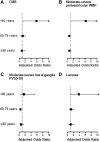Age-Specific Associations of Renal Impairment With Magnetic Resonance Imaging Markers of Cerebral Small Vessel Disease in Transient Ischemic Attack and Stroke
- PMID: 29523652
- PMCID: PMC5895118
- DOI: 10.1161/STROKEAHA.117.019650
Age-Specific Associations of Renal Impairment With Magnetic Resonance Imaging Markers of Cerebral Small Vessel Disease in Transient Ischemic Attack and Stroke
Abstract
Background and purpose: It has been hypothesized that cerebral small vessel disease (SVD) and chronic renal impairment may be part of a multisystem small-vessel disorder, but their association may simply be as a result of shared risk factors (eg, hypertension) rather than to a systemic susceptibility to premature SVD. However, most previous studies were hospital based, most had inadequate adjustment for hypertension, many were confined to patients with lacunar stroke, and none stratified by age.
Methods: In a population-based study of transient ischemic attack and ischemic stroke (OXVASC [Oxford Vascular Study]), we evaluated the magnetic resonance imaging markers of cerebral SVD, including lacunes, white matter hyperintensities, cerebral microbleeds, and enlarged perivascular space. We studied the age-specific associations of renal impairment (estimated glomerular filtration rate <60 mL/min per 1.73 m2) and total SVD burden (total SVD score) adjusting for age, sex, vascular risk factors, and premorbid blood pressure (mean blood pressure during 15 years preevent).
Results: Of 1080 consecutive patients, 1028 (95.2%) had complete magnetic resonance imaging protocol and creatinine measured at baseline. Renal impairment was associated with total SVD score (odds ratio [OR], 2.16; 95% confidence interval [CI], 1.69-2.75; P<0.001), but only at age <60 years (<60 years: OR, 3.97; 95% CI, 1.69-9.32; P=0.002; 60-79 years: OR, 1.01; 95% CI, 0.72-1.41; P=0.963; ≥80 years: OR, 0.95; 95% CI, 0.59-1.54; P=0.832). The overall association of renal impairment and total SVD score was also attenuated after adjustment for age, sex, history of hypertension, diabetes mellitus, and premorbid average systolic blood pressure (adjusted OR, 0.76; 95% CI, 0.56-1.02; P=0.067), but the independent association of renal impairment and total SVD score at age <60 years was maintained (adjusted OR, 3.11; 95% CI, 1.21-7.98; P=0.018). Associations of renal impairment and SVD were consistent for each SVD marker at age <60 years but were strongest for cerebral microbleeds (OR, 5.84; 95% CI, 1.45-23.53; P=0.013) and moderate-severe periventricular white matter hyperintensities (OR, 6.28; 95% CI, 1.54-25.63; P=0.010).
Conclusions: The association of renal impairment and cerebral SVD was attenuated with adjustment for shared risk factors at older ages, but remained at younger ages, consistent with a shared susceptibility to premature disease.
Keywords: cerebral small vessel disease; chronic kidney disease; magnetic resonance imaging; stroke; transient ischemic attack.
© 2018 The Authors.
Figures

References
-
- O’Rourke MF, Safar ME. Relationship between aortic stiffening and microvascular disease in brain and kidney: cause and logic of therapy. Hypertension. 2005;46:200–204. doi: 10.1161/01.HYP.0000168052.00426.65. - PubMed
-
- Seliger SL, Longstreth WT., Jr Lessons about brain vascular disease from another pulsating organ, the kidney. Stroke. 2008;39:5–6. doi: 10.1161/STROKEAHA.107.496000. - PubMed
-
- Ryu WS, Lee SH, Kim CK, Kim BJ, Yoon BW. The relation between chronic kidney disease and cerebral microbleeds: difference between patients with and without diabetes. Int J Stroke. 2012;7:551–557. doi: 10.1111/j.1747-4949.2011.00732.x. - PubMed
-
- Umemura T, Kawamura T, Sakakibara T, Mashita S, Hotta N, Sobue G. Microalbuminuria is independently associated with deep or infratentorial brain microbleeds in hypertensive adults. Am J Hypertens. 2012;25:430–436. doi: 10.1038/ajh.2011.254. - PubMed
-
- Ovbiagele B, Wing JJ, Menon RS, Burgess RE, Gibbons MC, Sobotka I, et al. Association of chronic kidney disease with cerebral microbleeds in patients with primary intracerebral hemorrhage. Stroke. 2013;44:2409–2413. doi: 10.1161/STROKEAHA.113.001958. - PubMed
Publication types
MeSH terms
Grants and funding
LinkOut - more resources
Full Text Sources
Other Literature Sources
Medical

